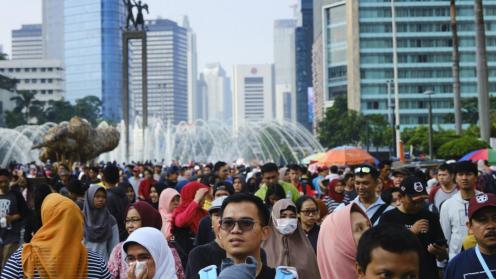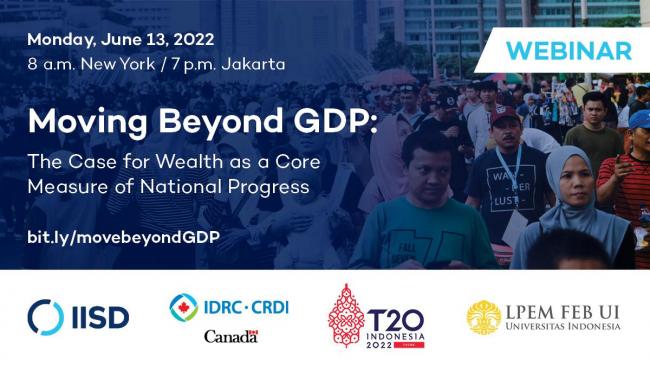We must place true value on the environment and go beyond gross domestic product (GDP) as a measure of human progress and well-being. Let us not forget that when we destroy a forest, we are creating GDP. When we overfish, we are creating GDP. GDP is not a way to measure richness in the present situation in the world.
-UN Secretary-General, António Guterres, Stockholm+50 Conference, 2 June 2022
With increasing international support for calls to move beyond GDP as a measure of national progress, the International Institute for Sustainable Development (IISD) convened a seminar to explore the adoption of an inclusive wealth (IW) index. This approach was first proposed by the eminent economist Partha Dasgupta in his 2021 report for the UK Treasury, titled The Economics of Biodiversity: The Dasgupta Review.
Welcoming participants, Lynn Wagner, IISD Senior Director of the Tracking Progress programme, recalled the UN Secretary-General’s plea for a move beyond GDP in comments delivered during the Stockholm+50 conference in Sweden, and noted international progress on work to develop an alternative index of progress. She cited work by the G7, the World Bank, the Organisation for Economic Co-operation and Development, the World Economic Forum, and the G20’s Think20 initiative on Global Cooperation for SDGs Financing (T20 TF9). She also described IISD’s work with Ethiopia, Indonesia, and Trinidad and Tobago.
Moderator Pedro Conceição, Director, Human Development Report Office, UN Development Programme, noted a key shortcoming of GDP is its focus on measuring flows, something we cannot bequest to the future. Commending an asset-based approach to measuring wealth, he observed that if every generation can bestow assets as good as those they have inherited, we can ensure a legacy for future generations. Recommending that participants read the Dasgupta Review, Conceição noted challenges of making judgements about what future generations will value and agreeing on a metric that brings together all assets that matter.
Keynote speaker Diane Coyle, Bennett Professor of Public Policy, University of Cambridge, described the UN’s adoption of a new accounting framework, the System of Environmental-Economic Accounting Ecosystem Accounting (SEEA EA), as a landmark decision. She described key moments in the longstanding debate on the shortcomings and blind spots of GDP, including attention to the informal economy, social capital, health, and intangible assets. Noting the availability of multiple alternative approaches to indices, Coyle underlined the importance of an approach that effectively supports policy assessment and practical decision making by limiting the number of indicators. She commended IW as a rigorous and systemic approach that balances multiple dimensions while addressing the need for a framework for policymakers to assess whether things are improving with relation to:
- Natural Capital
- Human Capital
- Social Capital
- Institutional Capital
- Produced or Fiscal Capital
- Intangible Capital (Knowledge, Ideas)
Coyle identified a number of outstanding challenges for the IW approach, including the need: to develop a full accounting framework; to include everything that matters; for a clear classification system; and for a full social cost approach to natural capital that does not rely solely on market pricing. She also mentioned geographical scope and spill over effects.
Erin Tansey, Director, Sustainable Inclusive Economies Programme, International Development Research Centre, Canada, described her partnership with IISD and the UN Environment Programme (UNEP) to generate knowledge and build capacity with a view to mainstreaming work on new IW measures. Noting a growing consensus that countries face a series of unsustainable choices if they continue to rely on GDP alone, Tansey described partnership projects to embed a better understanding of national accounting and build capacity among national statisticians in developing countries.
Bambang Brodjonegoro, Lead Co-Chair, T20 Indonesia, and Universitas Indonesia, identified two main challenges in moving beyond GDP. He described the statistical challenge of accounting for the informal economy in developing countries and the contribution of gross national product and gross national income per capita measures. On further work to move beyond GDP, he called for radical improvements in national accounting capacity. On the willingness of policymakers to move beyond GDP, Brodjonegoro cautioned that countries such as Indonesia, which engage in the exploitation of their natural resources, may be in no rush to adopt alternative measures of wealth if the inclusion of natural capital results in a reduced measure of GDP.
Pushpam Kumar, Chief Environmental Economist and Senior Economic Advisor, UNEP, reported that the UN Secretary-General is very keen to advance work on moving beyond GDP as part of “Our Common Agenda” with Member States, and has formed a high-level core group led by the Guy Ryder, Director-General, International Labour Organization. In a preview of UNEP work comparing per capita GDP and IW for 163 countries, due for publication in the fall, Kumar reported that natural capital is the only measure in continuous decline, suggesting policymakers will have to come to understand the trade-offs and opportunities for substituting one form of capital with another. He added that IW can help countries: track the triple planetary crisis (climate change, biodiversity loss, and pollution); and underwrite the value of new measures for supporting investment in natural capital and in the circular/green economy. He also highlighted the potential value of IW work for international financial institutions and sovereign wealth funds and the need to develop an international community of practice on moving beyond GDP.
Other issues raised during discussion included:
- the value of open participation in the debate on moving beyond GDP;
- the salience of including natural capital in wealth accounting;
- bequesting a sufficiently diverse portfolio of assets given the uncertainties around what future generations will value;
- the use of shadow pricing to close the gap between the valuation of assets (pricing) and the true value of assets as understood by human beings (e.g., aligning IW/welfare);
- policymaker buy-in, including by central banks and treasuries;
- Using the SDGs to drive engagement with the moving beyond GDP agenda;
- gender as an important dimension of alternative approaches to measuring wealth; and
- mapping inequality as a fundamental dimension of the statistical challenge.
Resources
Dasgupta, P. (2021), The Economics of Biodiversity: The Dasgupta Review. (London: HM Treasury)
IISD project on Measuring Wealth to Promote Sustainable Development
Contact: Livia Bizikova, IISD
To receive free coverage of global environmental events delivered to your inbox, subscribe to the ENB Update newsletter.

